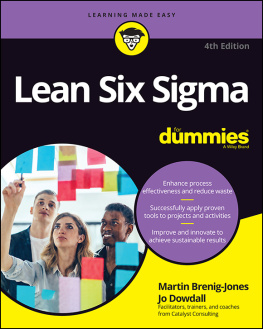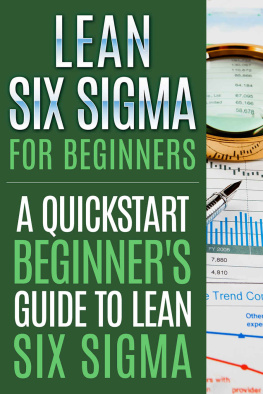
To our devoted wives Kelly and Jo for their absolute support
and understanding during the creation of this long-awaited
book. A special thanks to all the Six Sigma zealots!

Copyright 2006 by Greg Brue and Rod Howes. All rights reserved. Except as permitted under the United States Copyright Act of 1976, no part of this publication may be reproduced or distributed in any form or by any means, or stored in a database or retrieval system, without the prior written permission of the publisher.
ISBN: 978-0-07-144602-0
MHID: 0-07-144602-8
The material in this eBook also appears in the print version of this title: ISBN: 978-0-07-143008-1, MHID: 0-07-143008-3.
All trademarks are trademarks of their respective owners. Rather than put a trademark symbol after every occurrence of a trademarked name, we use names in an editorial fashion only, and to the benefit of the trademark owner, with no intention of infringement of the trademark. Where such designations appear in this book, they have been printed with initial caps.
McGraw-Hill eBooks are available at special quantity discounts to use as premiums and sales promotions, or for use in corporate training programs. To contact a representative please e-mail us at bulksales@mcgraw-hill.com.
This publication is designed to provide accurate and authoritative information in regard to the subjectmatter covered. It is sold with the understanding that neither the author nor the publisher is ngaged in rendering legal, accounting, or other professional service. If legal advice or other expert assistance is required, the services of a competent professional person should be sought.
From a Declaration of Principles jointly adopted by Committee
of the American Bar Association and a Committee of Publishers.
TERMS OF USE
This is a copyrighted work and The McGraw-Hill Companies, Inc. (McGraw-Hill) and its licensors reserve all rights in and to the work. Use of this work is subject to these terms. Except as permitted under the Copyright Act of 1976 and the right to store and retrieve one copy of the work, you may not decompile, disassemble, reverse engineer, reproduce, modify, create derivative works based upon, transmit, distribute, disseminate, sell, publish or sublicense the work or any part of it without McGraw-Hills prior consent. You may use the work for your own noncommercial and personal use; any other use of the work is strictly prohibited. Your right to use the work may be terminated if you fail to comply with these terms.
THE WORK IS PROVIDED AS IS. McGRAW-HILL AND ITS LICENSORS MAKE NO GUARANTEES OR WARRANTIES AS TO THE ACCURACY, ADEQUACY OR COMPLETENESS OF OR RESULTS TO BE OBTAINED FROM USING THE WORK, INCLUDING ANY INFORMATION THAT CAN BE ACCESSED THROUGH THE WORK VIA HYPERLINK OR OTHERWISE, AND EXPRESSLY DISCLAIM ANY WARRANTY, EXPRESS OR IMPLIED, INCLUDING BUT NOT LIMITED TO IMPLIED WARRANTIES OF MERCHANTABILITY OR FITNESS FOR A PARTICULAR PURPOSE. McGraw-Hill and its licensors do not warrant or guarantee that the functions contained in the work will meet your requirements or that its operation will be uninterrupted or error free. Neither McGraw-Hill nor its licensors shall be liable to you or anyone else for any inaccuracy, error or omission, regardless of cause, in the work or for any damages resulting therefrom. McGraw-Hill has no responsibility for the content of any information accessed through the work. Under no circumstances shall McGraw-Hill and/or its licensors be liable for any indirect, incidental, special, punitive, consequential or similar damages that result from the use of or inability to use the work, even if any of them has been advised of the possibility of such damages. This limitation of liability shall apply to any claim or cause whatsoever whether such claim or cause arises in contract, tort or otherwise.
CONTENTS
PREFACE
This book is intended primarily for senior managers who are preparing to become Six Sigma champions, to be responsible for promoting the methodology throughout the company and especially in specific functional groups and for supporting project teams. Champions must understand the discipline, techniques, and tools of Six Sigma so that they can select projects, establish objectives, and serve as coaches and mentors to members of project teams. Champions do not need the intensive training that is required for black beltsthe people responsible for leading the project teamsbut champions must know enough about the discipline, techniques, and tools to facilitate the efforts of the black belts and their teams.
This book is intended, then, to provide an overview of Six Sigma, to explain the techniques and tools, and to outline the phases in the standard implementation model. Basically, this is a 36-hour workshop for Six Sigma champions.
Here are our basic objectives:
 You will understand the essentials of Six Sigma.
You will understand the essentials of Six Sigma.
 You will know the roles and responsibilities of the people involved in Six Sigma.
You will know the roles and responsibilities of the people involved in Six Sigma.
 You will learn the basic vocabulary of Six Sigma.
You will learn the basic vocabulary of Six Sigma.
 You will gain a high-level understanding of the methods and tools used in Six Sigma.
You will gain a high-level understanding of the methods and tools used in Six Sigma.
 You will be able to identify the benefits of Six Sigma as a methodology for improving business processes.
You will be able to identify the benefits of Six Sigma as a methodology for improving business processes.
 You will be able to work as a champion with Six Sigma project teams, fulfilling all of the responsibilities with competence and confidence.
You will be able to work as a champion with Six Sigma project teams, fulfilling all of the responsibilities with competence and confidence.
This book is intended for Six Sigma champions. When we address you, the reader, we are addressing you as a manager who is ultimately responsible for a Six Sigma project, although you share those responsibilities with a black belt, a master black belt, green belts, and your fellow managers as members of the executive team. How you share those responsibilities will depend on your organization and your situation. Please read with that understanding in mind.
Also bear in mind that this book is not intended as a substitute for the training that a manager should receive to become a champion. Your Six Sigma initiative should provide you with sufficient training to work with the black belts, who will be receiving more extensive training, and with a master black belt, who will have even more training and experience. In other words, you wont be doing any of this alone or without training. This book is intended as a 36-hour course to provide you with a sufficient knowledge of Six Sigma to be able to participate fully and actively in starting a Six Sigma initiative, to get maximum benefits from any training, and to work effectively and efficiently with Six Sigma project teams.
Finally, as we emphasize in , Six Sigma can be used for many types of business activitiesproduction, assembly, transportation, retail, services, transactions, administration, and support. Throughout this book, well refer generally to products, services, and processes for the sake of convenience.
Some of the material used in this book comes from Six Sigma for Managers, by Greg Brue (New York: McGraw-Hill, 2002), and
Next page





 You will understand the essentials of Six Sigma.
You will understand the essentials of Six Sigma.